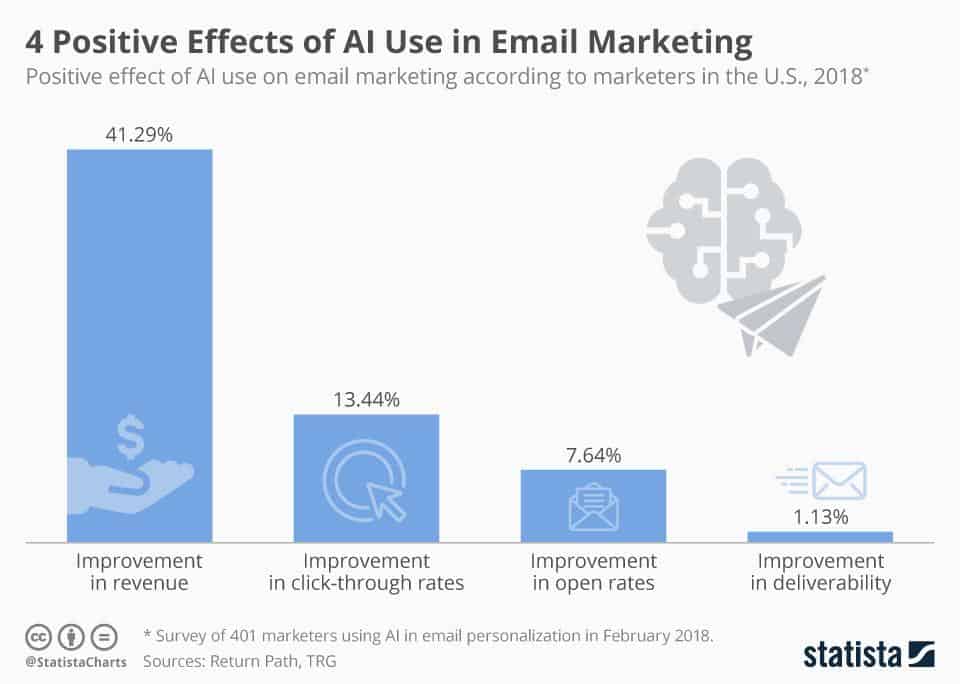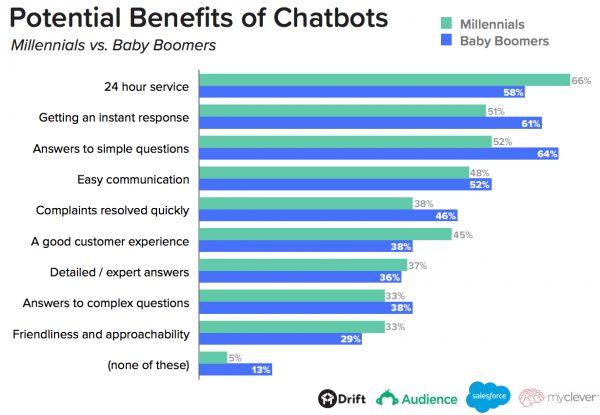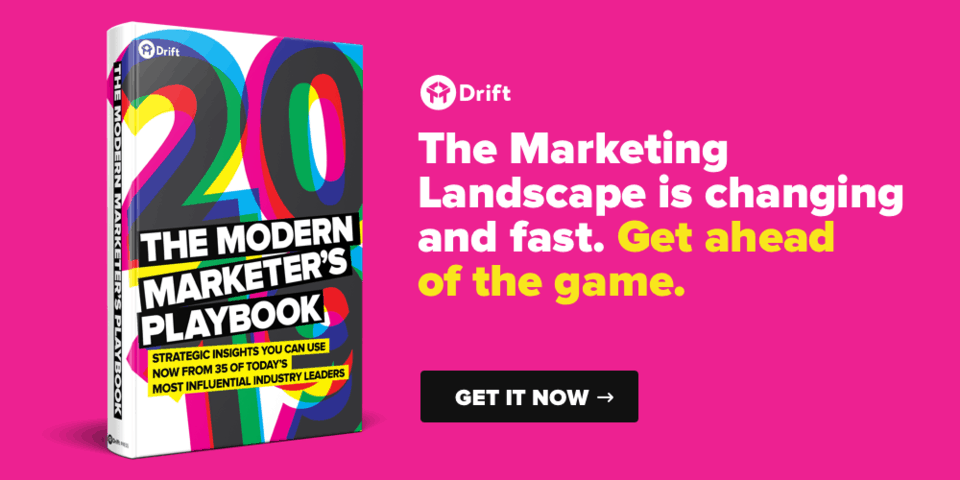
Editor’s Note: The following is a guest post from Atomic Reach. Interested in contributing content to the Drift blog? Email Gail Axelrod at gaxelrod@drift.com.
The goal of artificial intelligence, machine learning and marketing automation is to allow you to handle repetitive (but incredibly valuable) tasks, so you can manage more complex projects that are more appropriate for the human brain. AI not only makes your work life easier, but it can help you save money on staff and more efficiently meet your customer’s needs.
So, how is AI specifically changing the current landscape of marketing? Take a look at these stats:
- Sixty-one percent of marketers say AI is the most important aspect of their data strategy.
- Sixty-one percent of companies using AI are already using the technology —or plan to use it—for sales forecasting.
- Eighty percent of business and tech leaders say AI already boosts productivity.
AI is helping marketers craft efficient strategies, handle routine tasks, increase productivity, and innovate on marketing approaches. So how can you utilize it, and what should you expect as this field expands? Read on to learn how AI is changing the marketing landscape.
Content Marketing
Today, good content marketing isn’t just about the composition of content and the written word, it’s more so about data. Content marketers understand the importance of user data, and how they can properly utilize it to create personalized content that resonates with target audiences.
Instead of using guesswork to determine the content audiences want to see, you can now use AI to collect data as well as mimic the thought processes of your target audiences. From there, you can make more informed decisions about the creation and distribution of content.
For example, you can now use marketing automation software to create algorithms that can distribute content to audiences based on their past behavior. This trend is only the beginning as hyper-personalization will continue to become integral to attracting and retaining audiences.
AI also helps with predictive lead scoring—a process by which marketers assign values to content based on its potential to cause a conversion. A blog post, email newsletter, or chatbot could be the catalyst for conversion. Predictive lead scoring and content intelligence software can help users improve on what works.
AI is also enabling marketers to better curate content and select the best topics. For example, programs like BuzzSumo and Ahrefs, allow users to see subjects that are the most popular in their industry and even view popular content from competitors. Instead of having to search social media platforms, or blog posts manually, these programs can accomplish this for you.
AI is increasingly playing a significant role in what content marketers produce, and how they distribute it. For example, a January 2018 survey of over 2,600 design professionals by Adobe and Econsultancy revealed that 34 percent of marketing agencies use AI for content creation.
Detailed user data is allowing marketers to better tailor content to a specific audience. This is crucial because, as stats show, content is one of the most influential pieces of material marketers have to engage audiences.
SEO
While many parts of digital marketing are evolving due to AI, SEO may be one of the most technologically advanced components with the most opportunity for innovation.
Every second, 67,000 searches occur on Google’s search platform. As a result, many of their innovations and forward-thinking opportunities will have a lasting impact on how companies develop SEO strategies.
Google’s own emerging AI system, Duplex, can converse with users using natural language. The system is conditioned to recognize specific keywords to give users exactly what they’re looking for. In addition to defining the intersection of language and search, Google is also dabbling in “visual search,” as their new program, Lens, will allow users to search by using images of objects.
Overall Google is utilizing machine learning technology to better understand what individuals are searching for, and how their platform can provide the best results possible.
This process means that companies are going to have to become even more intentional in how they position their websites to meet Google’s requirements. Businesses can use AI in combination with SEO to address this in three significant ways: analysis, automation, and customization.
Regarding analysis, an AI program with an emphasis on SEO can help you monitor the competition, analyze the market, monitor site performance, track SERP, or optimize the website to attract more consumers. The data gathered from this can allow marketers to create information that uses long-tail keywords or terms that are more likely to attract targeted audiences.
Knowing what to do can be simple, but implementing it can be most of the battle. This step is where SEO-related automation comes into play. SEO software of today will become even better at keyword research, technical audits, tag management and assignment, and backlinking. Manually conducting these tasks is time-intensive. Luckily, many of today’s software programs will take care of these once-manual duties.
Lastly, SEO is imperative to personalization. According to research from Salesforce, 57 percent of consumers are willing to share data in exchange for personalized offers or discounts. Generally, personalization also makes customers feel more invested with a brand, and AI is allowing companies to capitalize on this tactic.
User data and information on their shopping behavior will enable you to tailor content to various segments, to word specific pages a certain way for certain audiences, and to push leads from social media to your website for an ultimate conversion.
AI is taking away the guesswork and mysticism from the SEO process, and allowing you to better take the lead on keywords and user experiences that attract audiences.
Email Marketing
AI is helping companies send the right emails to engaged customers at the right time. Gone are the days of having to manually send out mass emails, or hope that a mass message jumps out to everyone. Today, marketers can trust that their email client systems can personalize email marketing messaging to drive conversions.

(Source)
For example, programs like MailChimp can use past user behavior to suggest the time you should send out a newsletter or email blast. Other full-stack marketing software programs can help you determine the right order of keywords to use for a call-to-action (CTA) or a subject line. Again, with the power of data and automation, AI can use past customer behavior and user data to let you personalize your emails to provide the most relevant information to your audience.
Email is one of the only ways you can speak to customers directly. Social media and other forms of marketing don’t provide the same level of opportunity. The combination of email and AI can help you efficiently say exactly what you need to.
Conversational Marketing
Conversational is exactly what it sounds like. It’s the process of engaging customers to the point where companies have a one-on-one dialogue that leads to a conversion. This process could be through a phone call, email exchange, chatbot, or even a face-to-face meeting. The goal is to listen to and provide the feedback and information consumers need to decide whether to convert.
One of the most significant ways AI is helping to move conversational marketing forward is through human-to-humanlike interactions that involve real-time chatbots. Here, AI and machine learning are hard at work. From listening to consumer needs to create relevant answers, chatbots are the new wave of customer interaction.
The goal is to utilize AI-driven chatbots that not only provide answers to customers but that can also direct them to someone who can best answer their question. This tactic allows you to always be “available” for customers.
Take it from Mailshake’s Mark Lundqvist. “AI-powered chatbots have been a revelation in the world of converting website visitors to customers. Most visitors who are actually interested in buying have the same handful of questions. It’s expensive and time-consuming to cover live chat with a dedicated person, but chatbots can answer a good percentage of questions and qualify visitors without any drop-off in the customer’s experience. This has opened up chat to so many more companies than what was possible before, and improved user experience for website visitors who want their specific questions answered right away. None of it would be possible without the AI that powers those chatbots.”
“We use Drift chatbots on our website at Mailshake to qualify visitors and move them down the funnel to booking a demo. It’s been one of the biggest sources of revenue for our company in the last three months, and has more than justified the cost of hiring a full-time salesperson to handle all the leads.”
The desire for chatbots are there, PWC found that 43 percent of millennials would consider paying a premium for a hybrid human-bot customer service channel. These individuals understand the importance of the combination of the efficiency delivered by bots, as well as the humanity that is needed to make a solid connection.

(Source)
The same idea can be established with automated email messaging, and even with robotic virtual assistants that can answer customer calls and direct them to an answer or someone who can help. Conversational marketing is slowly but surely evolving into a topic dominated by machine learning and humans can adequately leverage this to provide personalization.
Final Thoughts
The world of marketing is always changing. Marketing has always been at the intersection of technology and customer experience, and the emergence of AI is no different. However, for you to be successful you have to utilize AI technologies and tactics that allow you to deliver more value and accessibility to consumers.
AI and machine learning in regard to marketing have come a long way, and the journey is far from over. As consumers begin to recognize the convenience of these tactics, many will offer more data and insights that allow you to utilize AI to make even more informed and relevant decisions. If one thing is true, the future is bright for data-driven marketers.






